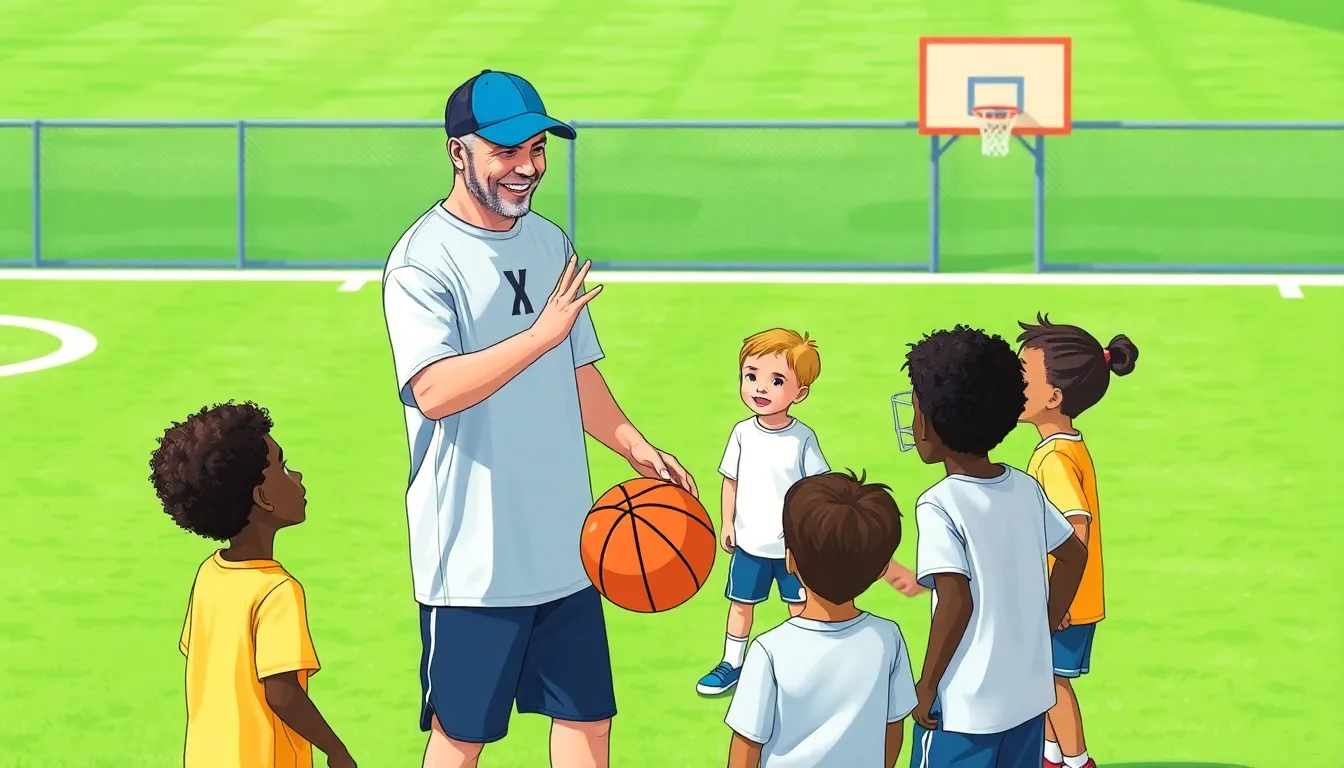Table of Contents
ToggleEvery kid dreams of being the next sports superstar, but without quality coaching, those dreams might just stay dreams. Imagine a world where kids not only learn the game but also develop teamwork, resilience, and a love for staying active. Quality kids sports coaching isn’t just about perfecting that free throw or scoring the winning goal; it’s about building confidence and skills that last a lifetime.
Coaches play a crucial role in shaping young athletes, turning them into not just players but well-rounded individuals. With the right guidance, kids can discover their potential while having a blast. After all, who doesn’t want to run around, make new friends, and occasionally trip over their own shoelaces? Let’s dive into what makes quality kids sports coaching a game-changer for every budding athlete.
Importance Of Quality Kids Sports Coaching
Quality kids sports coaching plays a crucial role in shaping young athletes. This coaching provides them with valuable skills and experiences that extend beyond the field.
Developmental Benefits
Quality coaching fosters physical development, enhances motor skills, and promotes coordination. Coaches provide guidance on techniques that improve performance while emphasizing safety. Emotional growth occurs as young athletes learn to manage competition pressure and cope with victories and defeats. Social skills flourish as teamwork and communication become essential in sports settings. Coaches who focus on holistic development create an environment that nurtures resilience and self-esteem, ensuring children enjoy their sporting journey.
Long-Term Impact
The influence of quality coaching reaches into adulthood. Participation in youth sports significantly reduces the likelihood of future health issues, promoting a lifelong commitment to fitness. Developing teamwork habits during childhood translates into better collaboration skills in the workplace. These athletes often exhibit higher levels of discipline and focus, important traits for success in various life areas. Moreover, children who experience supportive coaching often continue sports into later years, maintaining physical activity and forging lifelong friendships.
Characteristics Of Effective Coaches

Effective coaches exhibit traits that significantly impact young athletes. Coaches inspire growth, confidence, and a love for the sport through their approaches.
Communication Skills
Communication skills play a crucial role in effective coaching. Clear, precise instructions ensure athletes understand techniques and strategies. Active listening fosters an environment where players feel comfortable sharing their thoughts. Positive reinforcement builds confidence while addressing mistakes constructively. Coaches adapt their communication styles to meet the diverse needs of individual athletes, enhancing learning experiences. Engaging in open dialogue encourages athletes to ask questions, allowing for deeper understanding. Effective coaches prioritize regular feedback, creating continuous improvement opportunities.
Knowledge Of The Sport
Knowledge of the sport is essential for effective coaches. A thorough understanding of techniques, rules, and strategies enables coaches to teach players effectively. Coaches analyze opponents’ strengths and weaknesses to devise game plans that maximize team performance. Staying current with trends and research within the sport ensures coaches provide relevant information. Adaptability to various skill levels helps coaches tailor their teaching methods for all athletes. Demonstrating proper techniques reinforces learning and shows players the commitment to their growth. Continuous education and personal experience contribute to a coach’s expertise, benefiting young athletes.
Coaching Techniques That Enhance Learning
Quality kids sports coaching involves various techniques that significantly boost children’s learning. Several methods contribute to a positive coaching experience, ensuring young athletes grow both physically and emotionally.
Positive Reinforcement
Positive reinforcement encourages children to develop essential skills. Coaches emphasize achievements, whether large or small, to build confidence. Praise for effort rather than just success cultivates resilience. Recognizing individual progress fosters a love for the sport, making training sessions enjoyable. Frequent acknowledgment by coaches helps children feel valued, promoting an encouraging atmosphere. This method not only motivates athletes but also nurtures their commitment to improve over time. A balanced approach between encouragement and constructive feedback strengthens their overall development.
Age-Appropriate Training Methods
Age-appropriate training methods cater to the developmental stages of young athletes. Coaches tailor activities to suit their physical capabilities and understanding. Implementing fun and engaging drills keeps children excited about learning. For instance, younger athletes benefit from play-based activities, while older participants engage in more structured training. Coaches adapt techniques to enhance all skill levels, ensuring each child progresses effectively. Safety remains a top priority, as appropriate training minimizes the risk of injury. Involvement in various activities promotes versatility and enhances overall performance, establishing a well-rounded foundation for all athletes.
Creating A Supportive Environment
Creating a supportive environment significantly enhances children’s sports experiences. Coaches play a crucial role in this process by fostering team cohesion and camaraderie.
Building Team Chemistry
Team chemistry develops through shared experiences and effective communication. Coaches encourage athletes to build relationships through team-building activities. Regular group drills promote collaboration, allowing children to trust one another. Emphasizing teamwork helps players understand each other’s strengths and weaknesses. Sharing successes, no matter how small, establishes a bond that transcends individual achievements.
Encouraging Parental Involvement
Parental involvement boosts children’s confidence and engagement. Coaches can create open channels of communication to keep parents informed about practices and games. Providing opportunities for parents to volunteer enriches their connection to the team. Workshops can also educate parents about supporting their children through both victories and losses. When parents actively participate, children feel more motivated to perform and enjoy the journey in sports.
Measuring Success In Kids Sports Coaching
Measuring success in kids sports coaching involves evaluating various aspects of athletes’ growth. Coaches focus on multiple metrics to gauge progress in skill development and emotional maturity.
Skill Development Metrics
Skill development metrics play a crucial role in assessing young athletes. Performance assessments track improvements in specific techniques and fundamental skills. Observing participation levels during practices indicates engagement and commitment. Additionally, coaches can gauge athletes’ understanding of game strategies by their ability to execute plays. Regular feedback from coaches helps identify strengths and areas for improvement, ensuring well-rounded development. Implementing structured drills that target specific skills allows for measurable advancement over time.
Emotional and Social Growth
Emotional and social growth is equally important in evaluating success. Coaches monitor children’s reactions to winning and losing, as this reflects their ability to handle competition. Building teamwork skills through collaborative practices fosters social interactions, enhancing friendships among teammates. Observations during team activities provide insight into athletes’ social dynamics and peer relationships. Communication skills often improve as children learn to express their thoughts and feelings. Coaches can further promote resilience by encouraging positive self-talk during challenges, supporting athletes’ emotional well-being.
Quality kids sports coaching is crucial for nurturing not just athletic skills but also essential life lessons. Coaches play a fundamental role in shaping young athletes into confident and resilient individuals. By focusing on teamwork and emotional growth, they create an environment where children can thrive both on and off the field.
The lasting benefits of effective coaching extend beyond the game. Children develop a lifelong appreciation for fitness and healthy competition. With the right guidance, they learn to navigate challenges and celebrate achievements, fostering a sense of community that lasts a lifetime. Investing in quality coaching is an investment in the future of our youth, ensuring they grow into well-rounded adults ready to face life’s challenges.










